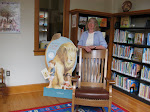My office has been described as “cheerfully untidy.” I’m not sure what qualifies a mess as “cheerful.” Untidy is rather obvious.
It’s an odd state for someone who goes crazy over messy shelves and misplaced books. The fact of the matter is I’m afraid to put anything away. If I file something it will be lost forever. I will be madly searching for the craft idea under ‘c’ for craft, or ‘p’ for program, only to discover two months later I’d put it under ‘k’ for kid’s or ‘s’ for summer reading. I need a cross-indexed catalog for my filing system that lists all the things I might have filed something under.
It’s easier to just leave it all on my desk. Somewhere in one of those piles is the piece of paper I saved just for this occasion. I just need to look through all the piles.
I’d like to say the problem is stress. Too much to do, too much to remember. But, I’m beginning to be afraid that the old mind is just not what it used to be. There’s just too much stuff in there. Adding something means, deleting something else.
I used to refuse to have a day planner, saying if I had so much to do I couldn’t remember it all, than I was doing way too much. But now, I can’t remember what I’m supposed to do today, no less next week. People tell me I need an iphone or smartphone. I could do everything with it, call people, take pictures, keep my schedule. But really, I’m already forgetting things. Do I want my life organized on a device I might set down somewhere and not be able to find? And then there’s learning how to use it. I might need another degree just to access my calendar!
Despite that fact, I keep trying to cram more information into my head. I check out ten books a week, sure I need to read every one of them. And then I bring back nine (or sometimes, sadly more) unread, not having found the time to do more than read the inside flap or the back cover. My shelves are full of books I’ve been meaning to read for years and alas only half of them have actually been read.
A lot of people get rid of books after they read them. But not me. I hold on to them, sure I’ll need to refer to them again. But I don’t underline in books, or turn down the page corner. (Don’t even think about doing that to a library book!) So instead I write out quotes I want to remember in my journal. But years later, when I want that quote, I can’t find which of the journals filling my book case actually contain it. I started putting post-it notes in books, with my comments on the text. But unfortunately, when I go back I have no idea what the cryptic note means, or why I cared about that paragraph anyway!
Now, I’ve started using those little sticky arrow things that usually say “sign here.” Only they’re meant to point me to the best parts of a book, the things I want to remember. Last night Bruce, noticing one of those arrowy things on every single page of a book I was reading said, “Really, Priscilla, why bother?”
He’s right, of course and not just because I want to remember everything! A couple of years ago I read Marion Woodman’s “Dancing in the Flames.” I talked about if for months, reciting her ideas over and over. Last month, I thought I really needed to find those quotes again. I checked my journal sure I’d copied them down and couldn’t find them. So, I decided to re-read the book. Except there was nothing in it that vaguely sounded like what I remembered reading before.
“Are you sure it’s the right book,” Bruce asked.
“Of course, I am. It’s the only Marion Woodman book I’ve ever read.” He gave me the look, the one that says I may be losing it. But I’ve decided Marion just isn’t as smart this year as she was two years ago. I’m sure that has to be the problem.
A mind is a terrible thing to waste – but losing it’s pretty darn hard, too. But I’m sure mine’s not lost. It’s just cheerfully untidy!

